A rescue operation for the crew of a downed Loach helicopter doesn’t quite go as planned and the rescuers become victims themselves. Read the harrowing story of what happened on that tragic mission.
By Richard Toops
In January 1968 PFC Richard Toops went on to Infantry OCS at Ft. Benning, Ga. graduating in September 1968. He was then assigned to Ft. Leonard Wood, Missouri as a 2LT Training Officer for Basic Trainees (the very same unit he went through Basic himself). He later attended Helicopter Flight Training at Ft. Wolters, Texas then Ft. Rucker, AL – graduating as a Helicopter Pilot in 1969.
In July 1970, 1LT Toops was assigned to the 240th Assault Helicopter Company, Greyhounds, as a Squad Leader, and later as an Assistant Flight Leader.
On January 22, 1971, CPT Richard Toops and his good friend WO Bill Seaborn, AC, were on a rescue mission for a downed Loach, the Proud Mary, from Delta Company, 3/4th Cav, 25th Infantry Division. The following is what happened on that day:
Around 0900 hrs, the White Flight Platoon (two slicks) from the 240th Assault Helicopter Company (Greyhounds), 222nd Aviation Battalion, 1st Aviation Brigade, were refueling at Bearcat, Vietnam following a morning mission with the 11th Special Forces (SF) at Long Than North, South Vietnam.
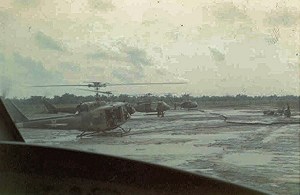
Onboard UH1 Huey helicopter (SN 66-163-56) was Aircraft Commander, WO William H. Seaborn Jr., myself as co-pilot, crew chief, SP-4 Jimmy Lance, and gunner, SP-4 William (Bill) Barker. Both guys had flown with me before and I liked and respected them very much. In Vietnam, helicopter pilots knew the crews were their lifeline and treated them as equal brothers. They kept our Huey’s flying, and in the field, guided us into tight landing zones while protecting us with their M-60 machine guns.
Our first-morning mission was uneventful and went off without a hitch. While refueling, we received an urgent and life-threatening call from the Bearcat tower requesting our assistance to extract the crew of a crashed Light Observation Helicopter (Loach), belonging to D Troop, 3RD SQUAD, 4TH CAV, 25TH INF DIV. The tower operator had received the call from CW2 Hugh McLeod, the pilot of the Cobra gunship accompanying the crashed loach. He was requesting aid for the crew of the crashed helicopter, Warrant Officer Rog Johnson, SGT Michael Petty, and SP4 Frederick Vigil. Bill and I didn’t have any reservations, we looked at each other and just said, “let’s go.” Any and all helicopter crews would have done the same thing. Bill and I were going on this rescue mission, and nobody was going to stop us.
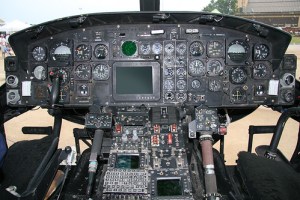
As the Assistant Flight Commander and ranking member on the mission, I contacted our Operations Office by FM radio and apprised them that we were going on a rescue mission for the crew of the downed Loach. There was no Officer present in Operations, “Go get um, and do it ASAP,” I said to the Spec 4 on duty, “tell them what our plans are.”
We finished refueling and flew to Long Than North to pick up the Special Forces rescue team that would be inserted to rescue the downed crew, Long Thanh North was just a few thousand meters from Bearcat.
Bill and I were starting to get pretty quiet, we tried some small talk but it fell flat.
Unusual?
No. Just getting in the serious mode.
We picked up four Special Forces troops in our helicopter, MSGT Virgil Glenn, SGT Hugh Opperman, SGT Frank Celano, and SGT Kenneth Lovelace. Warrant Officer Roger Moyer and his co-pilot on our sister ship picked up four as well. Capt Simpson, SFC Alton Monroe, SFC Martin Bennett, SSG Joseph Hill. I had flown with Roger many times and felt good that he, an experienced Aircraft Commander, was with us that day for the mission.
While we waited for the guys to load, Bill looked at me, actually staring intently, and asked me to put on my chicken-plate, a 22-pound piece of glued together ceramic sheets with a nylon cover (mine had no cover) – a bulletproof vest. I told him “I never wear it, you know that Bill, it’s too hot, and I’m not putting it on.”
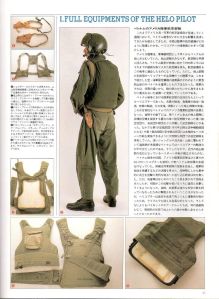
I had a God-given vision in early 1970 before going to Vietnam that I would only sustain an ankle injury in Vietnam so I never really thought my chicken-plate was needed. I only wore it the first few weeks in-country and since stored it under my seat like the majority of other pilots (protecting my underside). Many of my fellow pilots tried to get me to wear it but to no avail. After all, I outranked them and could do as I pleased.
I told Bill, “you didn’t worry about me wearing it this morning on our mission.”
Bill looked at me as serious as I had ever seen him, the truth is, he’s staring me down again. Bill said in a very somber way, “do it for me.”
Can you imagine that, now using his personality on me? “Do it for me”, he said.
So, I did. I knew at this point Bill was truly concerned, and as I said earlier, Bill had a way of getting others to do what he wanted.
I put the chicken plate on over my chest resting it on my lap underneath my restraint harness, it covered me from the neck to the top of my thighs. Truth be known, I was a little bothered. Bill knew my views on the chicken plate, we had talked about it many times before, but hey, he musta sensed something. This one seemingly simple act by Bill, thinking of me as his friend was what I felt saved my life that day.
The Special Forces men had rigged the ships with ladders previously that morning after our original mission. We were ready to go. We followed Roger’s bird in a loose staggered trail formation. I said a prayer to myself, something short, something I had done before, “Lord, we are in your hands.”
Upon arrival, we could see the crashed loach smoking and my attention was suddenly heightened.
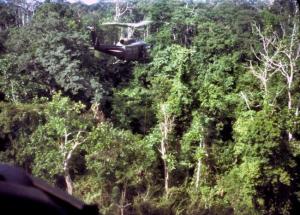
At this time we didn’t know that the loach helicopter had been shot down, crashing into a Vietcong base camp, strewn with hidden enemy bunkers. I later learned from the Special Forces mission statements that one of the crew died in the crash, and the other two survived – only to be captured and killed execution-style – at close range by the Vietcong, only minutes before our arrival. In retrospect, I’m glad Bill and I did not know this at the time.
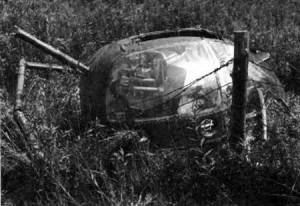
There was a twenty meter wide opening in the tree canopy to our front, just short of the crashed Loach. At the bottom of the hole, was the darker green thick, jungle vegetation…and the unknown. Roger Moyer went in first and dropped his ladders and troops on the left side of the opening, then pulled out. Nothing happened, nothing at all. So, I felt a new sense of security.
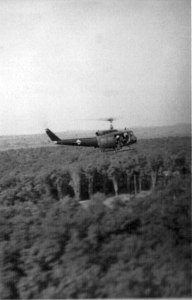
Our Huey went in next. We came in and hovered about 30 feet up and over the right side of the canopy opening, approximately 5-10 meters laterally from the first insertion and a few meters closer to the downed loach, and, un unbeknownst to us directly above the Enemy. We had lowered our helicopter down into the opening of the trees, the door gunners directing us, “go left, go right, forward a bit, go left etc,” our helicopter in Bill’s hands guiding it through the jungle canopy. We maneuvered through the tree branches as far as we could go. Our ladders were dropped, and the Special Forces team began descending the ladders.
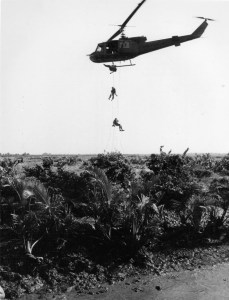
We were hovering among the trees and thinking that soldiers were still going down our ladders made our bird a great stationary target for the enemy below. Bill was flying the bird. I had my left hand on the hot mike switch on the radio control switches located on the center console between both pilot seats and my right hand loosely around the cyclic control as was our normal protocol entering and exiting both landing and pickup zones. Bill and I were silent, and only listening intently to our crew talking through the intercom in our helmets – keeping us from hitting the rotor blades on the trees on both our sides.
Suddenly, we came under attack by intense and heavy fire from AK-47s, a weapon with a very familiar sound. MSGT Verlin Glenn, the only one of the four Special Forces soldiers still on our helicopter later stated that we were receiving fire directed at the Special Forces troops on the ladders, into our cockpit, and at our tail rotor. MSGT Glenn, was shot in the chest and his ladder rung shattered by bullets; he jumped, landing in a thick bunch of vegetation, saving his life. The other three were shot and killed before reaching the ground. At the time we had been on site for only a minute or less. Bill and I both knew our crew chief and gunner were in a tough predicament because of the seven American soldiers on the ground and four more on the ladders below us, they could not fire back with our M-60 machine guns unless they could clearly see where the enemy fire was coming from. The chance of hitting our own men was just too great.
When the enemy fire erupted, loud, very very loud bullets entered the cockpit at a heavy rate. It was extremely violent, everything in the cockpit was hit and being shredded and destroyed. My left hand was blown into the air, and off of the radio switch, as bullets penetrated the ship and began destroying the radio console between Bill and me.
Now with a dead radio, I was unable to contact Roger’s ship, the Command and Control ship, or any of the gunships overhead. We were now all alone. The firing continued without letup. Everything in our cockpit, the dash, bubble of the helicopter, radio console, and my chicken plate were all being ripped apart – spraying shrapnel everywhere. The inside of our cockpit was literally disintegrating. When bullets go by you in the open you hear a pssttt sound, but now, it sounded like we were being hit by bricks or cannonballs flying at a 1000 ft per second, and it was oh so loud. Deafening. Bullets were ricocheting their way across my chicken plate and splattering me with shrapnel, but thanks to Bill insisting I wear it, they were not going into my chest.
At what seemed now like an unending attack, with tremendous noise and destruction something happened. Bill and I turned our heads and eyes just slightly towards one other and exchanged a quick look. I know we both needed some comfort from the other, some form of brotherly reassurance that this nightmare would end soon. Something, anything to stop the noise and devastation. Our commo was wasted and we couldn’t talk on the intercom or radio. As we both caught one another’s eye, Bill was struck and killed instantly.
I knew it because I was looking into Bill’s eyes when it happened. He did not suffer.
I suddenly gasped for air. Oh My! It, was such a terrible feeling. I was so sad and felt alone. Then, just as quickly, I was so mad….very mad! My head was exploding with emotion. I just wanted to go down there and kill um all with my bare hands. Just let me at um, please. All these thoughts in less than a second.
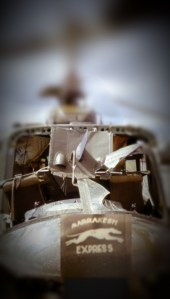
But time does not stop and my military training took over from my emotions. The ship was starting to feel the effects of the onslaught. It was unsteady. I had taken all the controls now and my mind was telling me to keep it together, Richard, come on, just get us outta here. I was going to try and bring us straight up, I didn’t know if the guys were still on the ladders or not, but knew if they were they would hold on. Some months earlier we extracted two Special Forces troops from contact with the enemy in War Zone D and had to carry them several miles with them hanging on the ladders while escaping the hostile fire.
Today I would have to clear the trees before we could go forward and get outta there. The helicopter then lurched violently, the nose turned down and the ship starting rotating to the right. As this happened the tail of the ship started rising up. I pulled additional collective and then pulled the cyclic back with my right hand to try and regain some control, I pushed the pedals as I tried giving more power, but I received no response and we started quickly spinning towards the trees on our perimeter. The engine was still operating, and by our helicopter-spin to the right, I knew our tail rotor must have been hit by enemy fire and rendered inoperative. I saw the trees coming towards us, and, I knew I was no longer in control, there was nothing I could do. The helicopter had taken too much damage and the controls were gone, my options were gone, my friend was gone – at this time I had no idea of the fate of Jimmy and Bill Barker. As I saw the trees coming, I said Lord, just make it quick. I was resigned to crashing, which we did quite violently into the trees. I was immediately knocked unconscious.
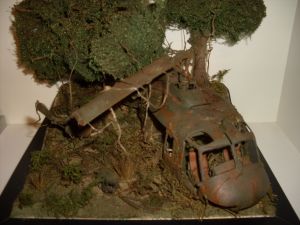
Our ship, Bill, myself, Jimmy and Bill Barton, all fell to the jungle floor as one big awkward, mangled mass of machine and men, metal breaking bones and tearing flesh as we slammed through the trees and finally hitting the ground. The turbine jet engine was still eerily humming away. But our plight was not over. Not yet. We weren’t above the enemy anymore – we were now in their living room.
I awoke from unconsciousness lying in the jungle in the middle of a Vietcong basecamp unaware of how I ended up outside the ship. I had the fleeting thought that maybe I was wrong, and Bill was down here with us alive…and that what I had seen was not real, shoot, I thought, I have been wrong many times in my life. I prayed, Lord…just let this be another one of those times. Then my concern shifted to our guys in the back, was Jimmy and Bill Barton alive?
I later learned that Jimmy had been thrown out over the M-60 machine gun mount upon crashing which split his torso and stomach wide open. Bill Barton suffered broken bones and other injuries, as he was thrown from the helicopter too. Although terribly wounded, he risked his life to pull Bill and me from the crashed Helicopter. While on the ground, I groaned from the in excruciating pain. My body was hurting so bad, and I could only see shapes, and it seemed so dark. I was suddenly slammed in the back by what felt like the butt of a weapon and heard a low but forceful tone telling me to shut up. It was enough to force me back into the security of my unconsciousness.
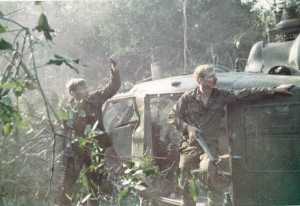
The guys from Rogers ship had come to our aid after finding the loach crew all dead and were now fighting for us. The bad guys were still there.
I learned from Captain Tom Brown, Maddog 6, our gunship leader that upon hearing of our crash, every gunship pilot and ship available at Bearcat was flying to our location to support a rescue mission. Everyone wanted to help in any way they could. Tom Brown said our gunship pilots were ready to light up the jungle.
The Special Forces troops and our aircrew performed their mission with great courage, valor, selflessness, and dedication. John Kennedy once said in his book Profiles of Courage “A man does what he must — in spite of personal consequences, in spite of obstacles and dangers, and pressures — and that is the basis of all human morality.” I am proud of all these guys. And to Bill for making me wear my chicken plate on this mission, he was my friend. I know he saved my life, not a doubt in my mind.
Our Gunner Bill Barker saved my life a second time, in spite of his injuries and with the enemy all around us. He risked his own to pull Bill and me from the helicopter after we crashed minutes before it was hit by an RPG that left it in a twisted mass.
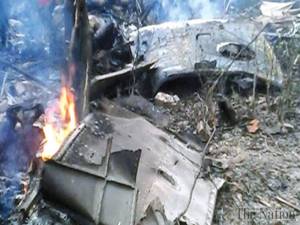
My life was saved a third time as the Special Forces troops from Roger’s ship surrounded our crash site and provided security during the rescue; Capt Simpson and SFC Monroe were wounded as they were hit by shrapnel from the RPG round that struck our crashed Huey.
I was saved a fourth time, a few weeks later, in a Hospital in Japan from internal bleeding.
Seven American heroes were killed that day and six were wounded – three of those killed were from the 25th Division Loach we were tried to rescue, four KIA and four wounded were from our ship, and another 2 wounded from Roger Moyer’s ship. We lost 2 helicopters that day and I was told the first medivac helicopter that came to get us out for medical attention took fire, was hit, and had to withdraw.
Ultimately, the 25th Infantry Division landed a company of infantry soldiers in a nearby LZ and come to our rescue. Our mission was finally over.
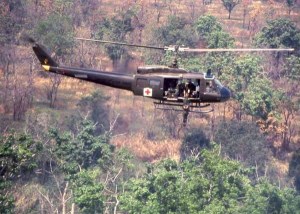
As I lay there on the jungle floor, my body in pain, here’s the tally on my injuries:
- one ankle shot, the bones all shattered
- toes on one foot were all broken and would never regain movement
- the tibia in one leg was broken
- the femur was broken and twisted, (when putting my leg back together it was an inch shorter)
- I had a deep hematoma on the inside of my legs that ran from my knee to my upper thigh
- one knee was badly damaged and had to be replaced, only regaining limited movement
- shot in the back, while laying on the ground after the crash, the bullet barely missing my spine
- my chest was bruised and beaten from bullets, but nothing – I repeat nothing, got through my chicken-plate
- one hand sustained shrapnel wounds from the bullets coming through the radio console
- my face was smashed in like it had been hit with a sledgehammer from the crash, the orbital bone, nose, septum, and jaw were all broken and flattened. My septum had a hole in it.
- the skin above my brow had been-peeled back, eyes hemorrhaged, and it would be many days before I could see more than a few feet. My face sustained shrapnel wounds and would take over 50 stitches to sew up.
But I was alive. God was with me through all those brave guys around me. During the next 5 1/2 months of hospital and 2 months of rehab,, I learned to eat again, walk again, and then got the news that I would never be able to fly again. My military career was over. Of all the injuries, the only one that prevented me from flying again was the destruction of my ankle, limiting the movement necessary for controlling the anti-torque pedals in a helicopter.
I now realized that my earlier vision from God regarding an ankle injury during the war was not only the injury itself but one that would end my military career. The only thing I ever truly wanted to do in life was now gone. They medically retired me from the Army.
I would gladly trade all that to have my friend Bill back a thousand times over.
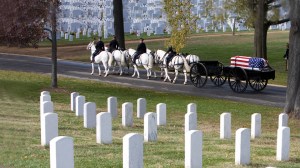
*****
In 2017, Richard Toops gave a speech in the town of Walthall, Mississippi (Eupora High School) in remembrance of their only soldier killed in the Vietnam War – Bill Seaborn. The above excerpt was the final part of his speech. Most of it focused on all the happy things he and Bill did together while serving in Vietnam. Bill was Richard’s best friend there and he wanted the townspeople to know that he enjoyed what he was doing both as a helicopter pilot and as a human being. Richard explained that when a soldier leaves home and is gone for months and then killed, family and friends lose that period of time. He wanted them to have it back.
*****
Thank you, Richard, for offering your story. I also want to thank you for your great sacrifice and service. We infantry grunts held chopper crews in the highest regard. Knowing full well, you’d come when called. No matter what. God bless!
This is the second article by Richard Toops. To read his earlier article, “An insiders view to the Peace March on the Pentagon, 1967” click on the following link: https://cherrieswriter.com/2020/04/19/an-insiders-view-of-the-peace-march-on-the-pentagon-october-21-1967/
Thank you for taking the time to read this. Should you have a question or comment about this article, then scroll down to the comment section below to leave your response.
If you want to learn more about the Vietnam War and its Warriors, then subscribe to this blog and get notified by email or your feed reader every time a new story, picture, video or changes occur on this website – the button is located at the top right of this page.
I also created a poll to help identify my website audience – before leaving, can you please click HERE and choose the one item best describing you. Thank you in advance!



Richard, thanks for your story, but thanks more for your testimony. Like you, I am a believer and prayed before every flight that God would protect me and my crew. You are so very right, that the unsung heroes of Army Aviation in Vietnam were the Crew Chief and Gunner in back. They kept us alive. I don’t remember the names of most of the pilots I flew with, but I still correspond with my Crew Chiefs during my first tour in ’69-’69, and 2nd tour in ’72. They are among my closest friends. Welcome home.
LikeLiked by 1 person
Thank you Les, your words are appreciated. Glad you made it home as well. It seems so far away now, but then like yesterday. God Bless those who did not make it home. I think of their families and loved ones often. Richard Greyhound 16
LikeLike
<!– /* Font Definitions */ @font-face {font-family:Helvetica; panose-1:2 11 5 4 2 2 2 2 2 4;} @font-face {font-family:Wingdings; panose-1:5 0 0 0 0 0 0 0 0 0;} @font-face {font-family:"Cambria Math"; panose-1:2 4 5 3 5 4 6 3 2 4;} @font-face {font-family:Calibri; panose-1:2 15 5 2 2 2 4 3 2 4;} /* Style Definitions */ p.MsoNormal, li.MsoNormal, div.MsoNormal {margin:0in; margin-bottom:.0001pt; font-size:11.0pt; font-family:"Calibri",sans-serif;} h2 {mso-style-priority:9; mso-style-link:"Heading 2 Char"; mso-margin-top-alt:auto; margin-right:0in; mso-margin-bottom-alt:auto; margin-left:0in; font-size:18.0pt; font-family:"Calibri",sans-serif; font-weight:bold;} a:link, span.MsoHyperlink {mso-style-priority:99; color:blue; text-decoration:underline;} span.Heading2Char {mso-style-name:"Heading 2 Char"; mso-style-priority:9; mso-style-link:"Heading 2"; font-family:"Calibri",sans-serif; font-weight:bold;} MsoChpDefault {mso-style-type:export-only;} @page WordSection1 {size:8.5in 11.0in; margin:1.0in 1.0in 1.0in 1.0in;} div.WordSection1 {page:WordSection1;} /* List Definitions */ @list l0 {mso-list-id:1374304283; mso-list-template-ids:-1;} @list l0:level1 {mso-level-number-format:bullet; mso-level-text:\F0B7; mso-level-tab-stop:.5in; mso-level-number-position:left; text-indent:-.25in; mso-ansi-font-size:10.0pt; font-family:Symbol;} @list l0:level2 {mso-level-number-format:bullet; mso-level-text:o; mso-level-tab-stop:1.0in; mso-level-number-position:left; text-indent:-.25in; mso-ansi-font-size:10.0pt; font-family:"Courier New"; mso-bidi-font-family:"Times New Roman";} @list l0:level3 {mso-level-number-format:bullet; mso-level-text:\F0A7; mso-level-tab-stop:1.5in; mso-level-number-position:left; text-indent:-.25in; mso-ansi-font-size:10.0pt; font-family:Wingdings;} @list l0:level4 {mso-level-number-format:bullet; mso-level-text:\F0A7; mso-level-tab-stop:2.0in; mso-level-number-position:left; text-indent:-.25in; mso-ansi-font-size:10.0pt; font-family:Wingdings;} @list l0:level5 {mso-level-number-format:bullet; mso-level-text:\F0A7; mso-level-tab-stop:2.5in; mso-level-number-position:left; text-indent:-.25in; mso-ansi-font-size:10.0pt; font-family:Wingdings;} @list l0:level6 {mso-level-number-format:bullet; mso-level-text:\F0A7; mso-level-tab-stop:3.0in; mso-level-number-position:left; text-indent:-.25in; mso-ansi-font-size:10.0pt; font-family:Wingdings;} @list l0:level7 {mso-level-number-format:bullet; mso-level-text:\F0A7; mso-level-tab-stop:3.5in; mso-level-number-position:left; text-indent:-.25in; mso-ansi-font-size:10.0pt; font-family:Wingdings;} @list l0:level8 {mso-level-number-format:bullet; mso-level-text:\F0A7; mso-level-tab-stop:4.0in; mso-level-number-position:left; text-indent:-.25in; mso-ansi-font-size:10.0pt; font-family:Wingdings;} @list l0:level9 {mso-level-number-format:bullet; mso-level-text:\F0A7; mso-level-tab-stop:4.5in; mso-level-number-position:left; text-indent:-.25in; mso-ansi-font-size:10.0pt; font-family:Wingdings;} ol {margin-bottom:0in;} ul {margin-bottom:0in;}
LikeLike
Leroy, I want to see your response but it came out unreadable on this end. Please resend. Thanks Richard Toops
LikeLike
Great narrative Richard. I felt like I was there with you in that slick. Thanks to you and all the other pilots and crew who were literally our lifeline. C Co, 5/7, 1st Air Cav 1970-’71.
LikeLike
Thanks Jamie, for your service and comments. here is a quick diddy on Crew Chiefs. Once while at Long Than North flying the SF mission we were in a standby mode. Noticing our crewchief about to change the fuel filter, a triangular thing with wires connecting the bolts, I said, hey tell me what to do and I will do it. I need to learn more about the things the crew does. He was thrilled I wanted to help, and I apologize I don’t remember who it was now. Well, he was patient and detailed in telling me what was needed. He was a great instructor, but I was not the best student. Somehow I pinched the rubber piece during installation. A few hours later we cranked up and we flew back to Bearcat, about a thousand yards and when we were shutting down the CC noticed fuel pouring out of the ship. Thankfully all ended well. Yep, I realized right then and there, a simple little task could have been a killer if we had been called to pick the SF folks out of the jungle rather then going back to Bearcat for the night. So all that said to note even the simple things the crew did could have been life threatening, but they always gave you the feeling, everything is good, we got this Sir.
LikeLike
Riveting account. Thanks for sharing your harrowing story, Richard. And thank you for your service! Ron Yates, 320th ASA Batt. 1963-66
LikeLike
Ron, Thank you for yours as well. The Military only works well when every Soldier, Sailor, Marine or Airman does his job. I guess we are all like a motor, take out a spark plug and you see the non smooth running. We were all proud to be part of the team.
LikeLike
Richard, the most important thing you stated was looking to GOD . Served 31 years and throughout, I always looked to HIM for guidance and protection. You definitely fulfilled the profile of courage statement in spades!!!!! God bless you and your loved ones.
LikeLike
Bulldog, Thank you for your service, I am truly jealous of your 31 years. I really wanted a career like that. Yes God is my father and yes if you were to read my entire speech you will hear an alter call in the end. Send me your email to Spootdr@gmail.com and I will steer you to a book that has the entire Speech. Thanks and God Bless, Richard Toops
LikeLike
A great story of camaraderie, duty, honor, and bravery CPT Troops. I only did 27 years and if “Bulldog 049” is from the 129th AHC, I was a Charlie Model gun driver, Cobra “Alemaster,” from the same. My feelings about our crews mirror yours and we all were protective of our slicks, as they were willing to risk all for us. Thanks for your story, well told as it is; Thanks for your Service, and Welcome Home Brother. Alemaster
LikeLike
Alemaster, The one thing I have noticed over the last 50 years is that no matter what Aviation unit a person is from, their thoughts seem to mesh with mine, to the most part. I don’t think I will ever be around a bunch who think so similarly. We were truly Brothers, and for anyone who thinks that is corny, it may be. But I am sticking with it till I die. Welcome home to all you guys, from the grunts to the aviation crews to the MPs, to the cooks, to the Arty guys, to the supply guys, to the Nurses and Doctors, the Records clerks, the Drivers, the Tankers, the boat Jockeys, the list goes on, and I know I left someone out and I am sorry,
LikeLike
Absolutely true Sir! I’ve stopped others when they start with “I was just a ……………” My response is something to the extent “you served your country when called. Welcome Home Brother.” (I’ve not had the opportunity to “Welcome Home a Sister” but I continue to hope to do so. Our 129th slicks were our first priority but we laid down a lot of fire for the ROK Tiger Division and the LRRPs of the 173rd. Heroes, all. Welcome Home Brother, Alemaster
LikeLike
NEVER FORGET!! AND WELCOME HOME. I CAME HOME AFTER 365 DAYS JUNE 18 1970. Americal Division 723rd MAINTENCE CO A CHU LAI IN I CORP.
LikeLike
As Veterans of the Vietnam War we all have a common bond. The adhesion we share is in that we all experienced similar events while working and living with three common purposes, protect one another, survive and return home. That bond is a feeling, unwritten and experienced in the soul of each of us. We each have our own ways of living our lives and dealing with our experiences. Over the years we have dealt with our thoughts and feelings in the ways that best able us to cope with those experiences and memories. We each have chosen ways to help our fellow brothers in arms, some of us donate to veteran causes, some of us partake in veteran ceremonies, some of us donate our time to veteran’s in medical facilities. Some of us actively support MIA/POW endeavors, others provide the monies for those who do, but I would say that every single veteran has had an impact on another veteran at some point in their life. Some continually, some on occasion. Thank
LikeLike
Amazing post. Thanks so much for sharing the story. And, thank you to all who served and who are serving!
LikeLike
You are very welcome and I said earlier. There is no greater satisfaction then doing something you love and at the same time representing your country.
LikeLiked by 1 person
Amazing story,wonderfully edited,true American heroes alive and kia,loved the faith in God!Thank you for your dedication and service!
LikeLike
Patrick, God and Country. Thats what it is about for so many of our Military then as today. God Bless them all.
LikeLike
God Bless you and your gallant crew and the SFC troops they did all they could. RIP Lest We Forget
LikeLike
Terrance, the SF soldiers in Vietnam were some of the greatest warriors this country has ever seen. I am proud to have known so many in Vietnam.
LikeLike
This is a remarkable story, of bravery, and having fellow soldiers helping to save each other’s lives. I am sure that you had help from above on that mission. I am sorry that you lost all of those friends, and maybe you will fly in the yonder with all of them in the future. I thank God every day, that there are men such as you all, willing to go to the fight. and get it done, no matter what. May God Bless all of your families forever. Know that you made a heck of a difference, and were, and are appreciated from then to eternity . jdc
LikeLike
Jerry, thank you. God gave me life and because of his son’s death on the cross, I live again. I thank God every day for what he has done and does daily. Richard Toops
LikeLike
This was an excellent story about very brave American soldiers. God bless and thank you all for your sacrifices.—-mike Kelley 1st air cav huey door guner, 1965-66 central highlands.
Sent from Mail for Windows 10
LikeLike
MIKE, For you Crew Chiefs and Door gunners
Thank You to Our Crew Chief and Gunners
Over the last 40 plus years I have had ample time to reflect on you guys in the back of our Huey that made it so much easier for us. We pilots sat up front with armor around out seats, you guys in the back sat in an empty doorway with only your flight suits to protect them. Yes, you had an M-60 machine gun, but that won’t stop a bullet. OK, you had a chest plate, but hey, it only covers a part of your body. You all seemed so professional, content and comfortable back there that I never truly thought of what truly went on in your minds as you peered out into the jungle and rice paddies with every LZ or PZ. I know that this alone was a brave and fearless thing you did even though you probably took it for granted. I remember going to the flight line each day and you guys would always greet me and have a welcome smile, I think I always did the same, I hope I always did. You always made me feel comfortable, if that is a word you can use in a war zone. Some of you guys were older then me, but most were not, even though we had different responsibilities and differing backgrounds, I felt you were my friend first, just like a bunch of High School guys going out to have an exciting time. I sensed you loved comradory the same as me. We bonded over a common cause, keep everyone safe and do our job. You spent hours working on our choppers, I helped at times, but I know now I should have done more. Please forgive me for that. PS.. I did change a fuel filter once and if you have not read my recollection of it, I failed to do it right, and almost killed us all. So, maybe you guys were better off with out me. You guys would sit in the back and trust us pilots to get you back home, we would sit in the front and trust that you guys had our ship ready to fly and then be on guard in the back protecting us insuring that we all got back alive. Oh my…..we were a wonderful and complete package, we were the ultimate team. I know that every Soldier, Marine, Sailor, Airman, Guard or Reservist is my hero and always will be, and closest of all to my heart is our Crewchiefs and Gunners, you were our most trusted and beloved heroes, and I know I am not alone among pilots who think that. Thank you guys for being there for us and for me. I salute you guys and love every one of you. Richard Toops GH16.
LikeLike
Heroes all, thank you for your service..
LikeLike
To Serve our country has always been a great honor for me. I carry that honor as all vets do in rememberence for our friends and brothers who did not come back alive. Thank You Richard Toops
LikeLike
On Sun, Apr 26, 2020 at 1:29 PM CherriesWriter – Vietnam War website wrote:
> pdoggbiker posted: ” By Richard Toops In January 1968 PFC Richard Toops > went on to Infantry OCS at Ft. Benning, Ga. graduating in September > 1968. He was then assigned to Ft. Leonard Wood, Missouri as a 2LT Training > Officer for Basic Trainees (the very same unit he went t” >
LikeLike
Well done good soldier!! and welcome home.
I was with Alpha Troop 3/4 Cav in 68. I didn’t get to finish my tour either. RPG’s are bad news!
LikeLike
Bob, The Centaurs have a website which has a 8mm movie of the Proud Mary flying the day before it was shot down. part of that clip was used in Ken Burns Vietnam film. Thank you for your service Bob. Richard Toops
LikeLike